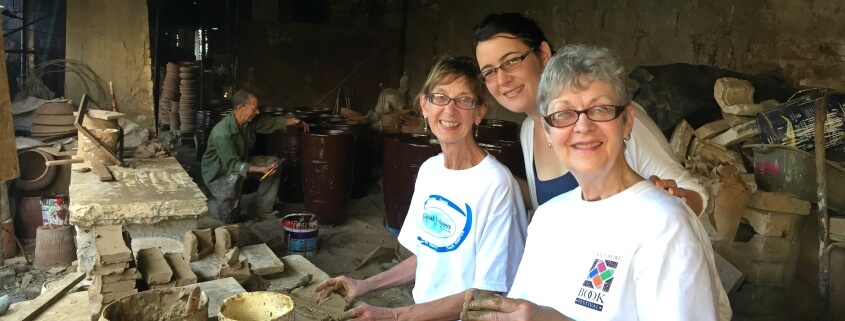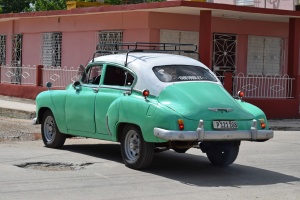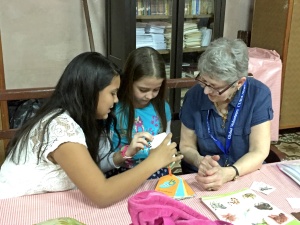Building Bridges Between the “Brothers”
by Mary Jansiewicz
Our Global Volunteers Cuba Program in February was absolutely amazing! We learned so much about Cuba and Cubans.
Number one: They love Americans; everyone we met was friendly and interested in us—and, speaking of those we got to know in Sancti Spiritus, we loved them right back. Probably not surprising that Cubans like Americans, since everyone in Cuba has one or more relatives living in the U.S. On many occasions, a Cuban we spoke with referred to us (Cubans and Americans) as brothers/hermanos. And, in fact, it was apparent how much we are alike: Baseball is the national pastime; U.S. cars (all of which are “historic: by U.S. standards) are beloved; American clothes, music, movies are ubiquitous. Everyone we talked to was very excited about President Obama’s visit in March.
Number two: Cubans are extremely resourceful. That they have kept those old U.S. cars—and even the “newer” 1975 USSR Muskovitches—running is only a part of the story (but emblematic of it). Everything is used, reused and/or re-purposed. Part of a tin can becomes a garden tool, discarded plastic bags are filled with soil and young plants for sale to locals, horse manure fertilizes the community organic gardens.
Number three: The economic system is changing. The centralized economy is gradually giving way to a market system. All workers are paid a small monthly income (equivalent to approximately 10 to 70 $U.S.) by the central government. But citizens can supplement their incomes in some ways: creating a “Hostal”—essentially a B&B, in one’s home brings in CUCs, the Cuban currency for foreigners (1 CUC = $1; there are about 25 Cuban pesos to 1 CUC). Those in the tourist industry can earn as much as, or more than, a doctor, just by getting tips in CUCs. Some Cubans (for instance, an engineer we met) create home workshops where they fashion parts for motorbikes, cars, or other mechanical devices for extra income.
Generally speaking, Cubans, though well-educated, are definitely not well off, and the buildings and infrastructure demonstrate that. They need patching cement, paint, brushes, hardware of all kinds—just about anything that can be used to fix something. The U.S. embargo, coupled with the Soviet pull-out in the 1990s has left them bereft of these things. Loosening or getting rid of the embargo would help them immensely.
Tourism could bring in much-needed cash, but there would still be shortages—and the black market would likely continue to be about four times larger than the legal market. And, the country is not yet ready for hordes of tourists. There are a number of problems in hotels, from reliable hot and cold running water to non-functioning electrical outlets and appliances. So that going to Cuba at this time could be considered a form of “adventure travel.”
This is where organizations like Global Volunteers can make a contribution. We go where we are invited, to do work that the host community requests. In addition to English conversation in the evenings, volunteers worked in the Living Water project, in a community garden, in the church’s soup kitchen, at restoring a mission chapel and caretaker’s home, besides the pottery co-op work. The organization was able to buy patching/painting supplies. And the small amounts of money each volunteer spent on keepsakes, etc. went into the local economy. Our “roughing it” at the hotels enabled future restoration so that those who visit going forward will have a more accommodating experience. All to help build bridges between the “brothers” who were separated for 50 years.






Leave a Reply
Want to join the discussion?Feel free to contribute!